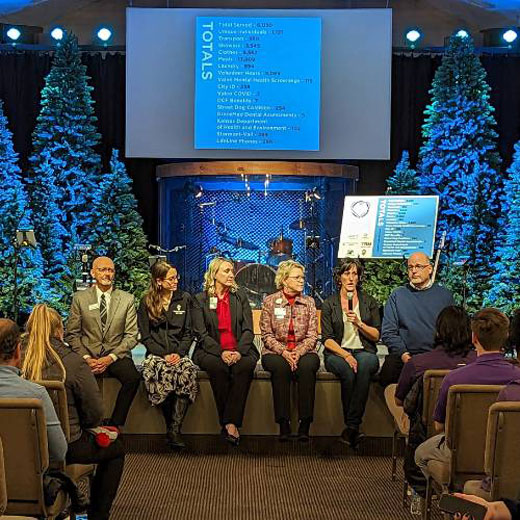March 21, 2023
Community visit spotlight: Topeka's comprehensive approach serves the unsheltered
 |
Jenny Falk, director of homeless outreach and director of MAP operations, sits alongside other MAP partners and talks about the innovative approach happening in Shawnee County to address the needs of the unsheltered. |
On any given night, approximately 157 people are unsheltered, sleeping outside or in places not meant for human habitation in Topeka. As homelessness continues to be a prevalent concern, Shawnee County has taken a multi-agency comprehensive approach to address this issue. The recent Kansas State University community visit in Shawnee County highlighted this innovative approach in an afternoon discussion.
The Shawnee County collaboration includes key providers — TRM Ministries, Valeo Behavioral Health Care, Stormont Vail Health, The Street Dog Coalition, K-State College of Veterinary Medicine and the Topeka Police Department — who teamed up to form the Mobile Access Partnership, or MAP, for the unsheltered population. MAP's collaborative approach provides mobile access to medical, social and behavioral health services throughout the community to the unsheltered and those whose living/housing situation is precarious.
MAP has provided service to 1,121 individuals and serviced 254 animals since May 2021.
Jenny Falk, director of homeless outreach and director of MAP operations, said that MAP extends dignity to all they come across and is breaking down barriers to people in need.
"The thing that has impacted me the most in witnessing our friends access services is seeing them start to believe that they do have value, they are loved and cared for and accepting the truth that they do deserve better than their current living conditions if they desire that," Falk said.
Twice a week, MAP’s services provide access to a shower and laundry trailer, mobile kitchen, preventative and wellness care, opportunities to attain identification through Topeka’s city ID program and so much more.
"It is my understanding that MAP may be the only program of its kind across our nation," Falk said. "Think of the impact communities could have across our nation if these basic services such as showers, food and clothing in tandem with the wraparound services were available. The health of each community and our nation as a whole would be impacted in unimaginable and sometimes unmeasurable ways."
Veterinary care is another powerful service provided through MAP. Allison Crow, a K-State alumna and team lead for The Street Dog Coalition, or SDC, Topeka team, believes in a one-health approach that values the lives on both ends of the leash.
"We attract many first-time visitors who come solely for veterinary care, and we always talk with them during their pet's appointment about their own needs," Crow said. "Many of our clients need help with housing, mental health support, food, etc. It is powerful to be able to learn about a need and tell a pet owner, ‘I know who can help meet that need — let's walk across the parking lot together and get you connected right now.’"
According to Crow, people who attend regularly build long-term relationships with the volunteers, creating an atmosphere of community and trust that is critical for long-term success in achieving housing, sobriety and positive life change.
Ron Orchard, a community outreach/shelter medicine fellow in the College of Veterinary Medicine, said connecting with Crow became a valuable opportunity, especially for the K State College of Veterinary Medicine shelter medicine and community outreach program.
"We had the chance to meet with Dr. Crow and show her one of the tools we had to help with the mission of the organization, the Wellness on Wheels, or WOW," Orchard said. "Partnering with KSU allows MAP/SDC to raise the bar for the services they offer, and our partnership with these organizations allows us to create a learning experience for our students not available in the traditional veterinary teaching hospital setting. It allows us to create veterinarians who are well rounded and practice ready."
Orchard and Crow both received master’s degrees in public health from K-State. Orchard said the public health program prepared them to understand that public health interventions often require creativity and meeting constituents where they are.
"MAP allows us to spend time building trust with the attendees of these events," Orchard said. "We often hear that it was the veterinary involvement that built the trust needed for these folks to seek care from the providers of human services at MAP. Public health scholars have been studying this phenomenon, and the literature is starting to show that partnering veterinary services with human-facing services with programs like MAP improves human health outcomes. This is why it was important for K-State to be involved."
Explore K-State's regional community visits and engagement partnerships through our StoryMap or find complete information about regional community visits. K-State faculty, staff or students who are interested or currently immersed in university-community engagement work can contact the Office of Engagement for opportunities to begin or grow scholarly work.
